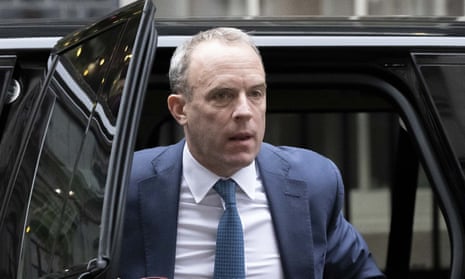Dominic Raab’s controversial bill of rights may be axed again, as a senior Tory MP said they were confident “wise heads in No 10” would lead the government to perform yet another U-turn.
After a series of climbdowns by Rishi Sunak this week over planning and long-promised pieces of legislation, he was urged by the former justice secretary, Robert Buckland, to avoid a protracted battle that could take up hundreds of hours of time in parliament.
The prime minister is said to have told Raab he is minded to deprioritise the bill, given concerns it could spark a row between Tory MPs and be blocked by the House of Lords, stalling the progress of other bills.
The bill of rights has been Raab’s pet project for years. He proposed it under David Cameron and revived the idea under Boris Johnson before Liz Truss scrapped it during her short-lived administration.
Sunak promised to bring the bill back, but MPs have not yet begun debating it and there is no date for them to start doing so.
The bill is designed to give legal supremacy to the UK supreme court and make it explicit that UK courts can disregard rulings from the European convention on human rights – to help solve the impasse over the removal of migrants who arrive by irregular means to Rwanda.
It would also place new restrictions on how human rights can be used in claims against the government.
Buckland, who is a king’s counsel, said he believed Downing Street would be giving “anxious consideration” to the bill’s future.
He said: “The prime minister is a pragmatist, he’s already demonstrated that he’s able to listen and to adapt and to move sensibly, in my opinion, on a number of issues relating to energy security, for example – and this is another case in point.
“At a time of a busy parliamentary schedule, a bill that was due to have its second reading way back in September is not even forthcoming yet. And the parliamentary session will be over by April.
“All these questions, I’m sure, will be looming large on the mind of his advisers. And they will ask the question – and I love the old wartime adage about fuel economy – is your journey really necessary?
“I’m pretty sure that wise heads in No 10 will say: ‘Well no, it’s not’. Some measure of reform, yes. But not this.”
Sunak’s control over his party has come under renewed question this week, given that he scrapped the mandatory housing target on Monday, reversed the ban on onshore windfarms on Tuesday and then oversaw the approval of a new coalmine – all in the face of potential Tory rebellions.
The schools bill was also scrapped, and no date given for the publication of the transport bill – leaving little time before the end of the current parliamentary session, in the spring.
Buckland said the bill of rights was “worrying” and should be “withdrawn and recast” or else it would get an “absolute mauling” in parliament because of pointless sections and poor drafting.
“I just don’t see what the real purpose of a lot of these clauses is,” he said at an event organised by the policy journal Chamber. “I hope that the prime minister will be advised that he really needs to cut down or withdraw the bill before more damage is done.”
after newsletter promotion
Dominic Grieve, the former attorney general, also said Sunak was trying to hold together a divided party. He said attempts to reform human rights legislation had “undoubtedly been pushed by a section of the party, and seems to have a rather strange almost talismanic precedents with party members”.
Grieve said the justice system was in “serious crisis” and urged the prime minister: “Don’t distract yourself by going for this project, which is likely to give very little benefit to the Conservative party.”
Sources close to Raab insisted they had not yet given up on the bill, and stressed it remained part of the government’s agenda.
Raab has previously claimed the bill is an evolutionary, rather than revolutionary, change from the Human Rights Act, and a fulfilment of the 2019 Conservative manifesto promise to update the legislation.
It has been sold as a way to try to fix what the government has described as a “broken” asylum system and combat the number of small-boat crossings in the Channel.
If axed, government sources indicated some measures could be injected into other pieces of legislation, including one to be unveiled by the home secretary, Suella Braverman, in the new year.
Some insiders believe No 10 is waiting for the outcome of an investigation into bullying claims against Raab, which he denies.
A source said: “Rishi has probably calculated the risk of Raab resigning if the bill of rights remains in limbo, and judged he wouldn’t given it would look bad to do so during the investigation. Once that’s done, then No 10 will be forced to take a view.”
A Downing Street spokesperson said: “We’ll come forward with plans for legislation in the usual way.”
